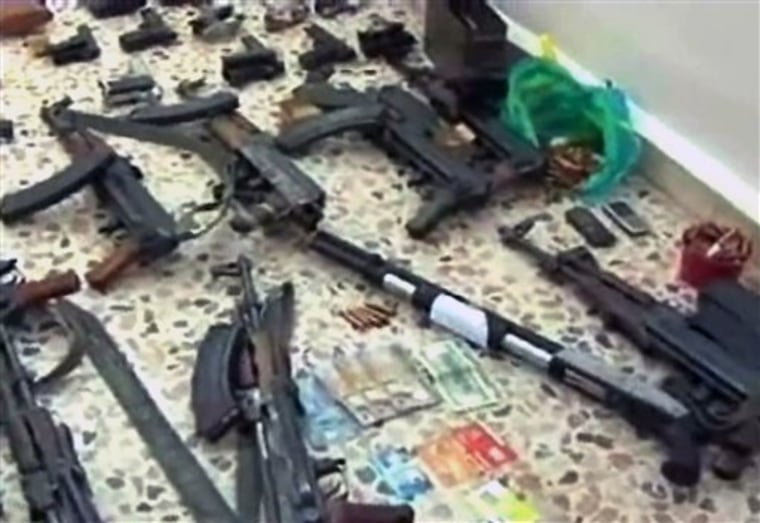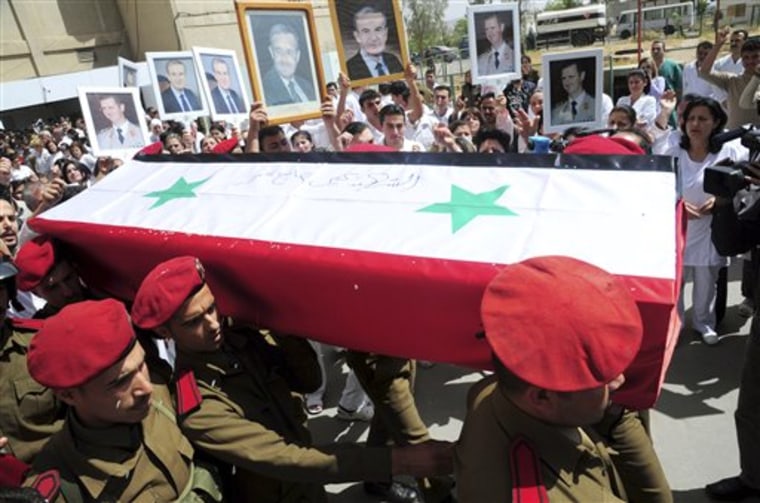The city at the heart of Syria's monthlong uprising ran low on food, water and medicine Wednesday as the army sent in more tanks and reinforcements as part of a widening crackdown against opponents of President Bashar Assad's authoritarian regime, witnesses said.
Two residents in Daraa said at least five army officers had sided with demonstrators, and conscripted soldiers sent into the city were quietly refusing orders to detain people at checkpoints and were allowing some people through to get scarce supplies. But the Syrian government denied that there had been any splits in the military, which is seen as fiercely loyal to Assad.
Gunfire and sporadic explosions were heard in Daraa, two days after the military rolled in — backed by tanks and snipers. The army also deployed tanks around the Damascus suburb of Douma and the coastal city of Banias, the site of large demonstrations recently.
"We have no electricity, no water, no telephones and no bread," resident Abdullah Abazeid told The Associated Press by satellite telephone from Daraa, where the uprising began more than five weeks ago. "The situation is terrible."
Assad is trying to crush the uprising that poses the gravest challenge to his family's 40-year ruling dynasty. Since mid-March, more than 450 people have been killed across Syria in the crackdown, with 120 dead just over the weekend.
The repression, however, has only emboldened protesters who started their revolt with calls for modest reforms but are now increasingly demanding Assad's downfall.
Media blackout
Syria has banned nearly all foreign media and restricted access to trouble spots since the uprising began, making it almost impossible to verify the dramatic events shaking one of the most authoritarian regimes in the Arab world.
Eyewitness accounts coming out of Syria have caused world leaders to increase their criticism of the Assad regime. The governments of five European nations summoned Syrian ambassadors Wednesday in a coordinated demand that Assad stop shooting at his people. Germany said sanctions were possible if the crackdown didn't ease, echoing remarks by Britain's foreign secretary a day earlier.
A group of opposition figures in Syria and abroad warned Assad that his regime will collapse unless he ushers in democracy.
"Syria is at a crossroads," said the statement from the National Initiative for Change. "The best option is for the leadership of the regime to lead a transition to democracy that would safeguard the nation from falling into a period of violence, chaos and civil war."
The relentless government throttling of the protest movement showed no sign of letting up.
Stun grenades
One Douma resident said security agents were going house to house, carrying lists of wanted people and conducting raids. If the agents did not find the person they were looking for, they seized his relatives, the resident added.
A witness in Banias said the army redeployed tanks and armored personnel carriers near the main highway into the city.
In the coastal city of Latakia, an activist said security forces fired live bullets and a stun grenade at demonstrators in poor neighborhoods near the city's Palestinian refugee camp of al-Ramel. He said four people were wounded and several others were detained.
Most residents contacted by the AP for accounts of the events in Syria spoke on condition of anonymity out of fear for their safety.

The Syrian armed forces said in a statement that army units continued their operations in Daraa and the countryside to chase "extremist terrorist groups." It said the groups attacked troops near the Golan Heights, killing three officers and wounding 15.
State-run Syrian TV said army units halted groups of "armed terrorists" who blocked the road and opened fire in Daraa. The report said the attack killed one member of the armed forces and wounded five.
Assad has blamed most of the unrest on a "foreign conspiracy" and armed thugs, not true reform-seekers.
The opposition is getting more organized as the uprising gains momentum, but it is still largely a grassroots movement. There are no credible opposition leaders who have risen to the level of being considered as a possible successor to Assad.
Also Wednesday, 16 lower-ranking members of the ruling Baath Party from Banias and nearby villages resigned to protest the crackdown — a small move of defiance but one that would have been unthinkable even a month ago in Syria.
"We declare our condemnation, shock and anger," the statement said, adding that "honorable and innocent citizens" were subjected to gunfire and torture.
They accused security forces and pro-government gunmen known as shabiha of opening fire at homes, mosques and churches and working to incite sectarian strife between the country's Sunni majority and Assad's minority Alawite sect, an offshoot of Shiite Islam.
"We announce our resignation from the party without any regrets," the statement said.
Sanctions weighed
In Paris, the French Foreign Ministry said France, Britain, Germany, Italy and Spain summoned Syrian ambassadors in their countries and told them that they condemn the violence and said Assad must change tactics.
The German government said it would strongly support European Union sanctions against the Syrian leadership, and German Foreign Minister Guido Westerwelle said an arms embargo, asset freezes and travel restrictions were possible.
"If there is not an immediate change of course by the Syrian leadership, the international community will have to come up with consequences — then sanctions against Syria will be inevitable," Westerwelle said.
The European condemnation is a significant personal blow to Assad, a British-educated, self-styled reformer who has made a high priority of efforts to bring Syria back into the global mainstream. It was far from clear, however, if Europe's shaming of Assad would have enough impact to moderate his government's brutal handling of the Syrian uprising.
U.S. officials have said Washington has begun drawing up targeted sanctions against him, his family and his inner circle to boost pressure to halt the repression.
The U.N. Security Council failed to agree Wednesday on a statement circulated by Britain, France, Germany and Portugal condemning the violence in Syria. During consultations, several members — including Lebanon — indicated they were opposed, council diplomats said, speaking on condition of anonymity because the meeting was closed. Security Council statements to the media must be approved by consensus.
Susan Rice, the U.S. ambassador to the U.N., has said the United States has evidence of active Iranian support for the Syrian government's crackdown. A staunch Iranian ally, Syria also backs Hezbollah in Lebanon and Hamas in the Gaza Strip.
Syria's U.N. Ambassador Bashar Ja'afari said some armed groups have taken advantage of the demonstrations and started shooting. He said Assad told security forces not to open fire in response and claimed "dozens and dozens of security officers" were shot and killed.
The U.N.'s top human rights body agreed to hold a special human rights session Friday on Syria to try to stop Assad's forces from gunning down his people.
In the capital of Amman, Jordan, about 300 people held demonstrations in front of the Syrian Embassy and near a northern border post.
"It's only a matter of time before Assad's regime will collapse and you'll be free," said protester Mohammed Ghwarneh, 27, in the town of Ramtha, which borders the Syrian city of Daraa.
The protesters waved banners that read: "No shedding the blood of innocent people."
___
Associated Press writers Sameer N. Yacoub and Jamal Halaby in Amman, Jordan, Diaa Hadid in Cairo, John Heilprin in Geneva, and Edith M. Lederer at the United Nations contributed to this report.
